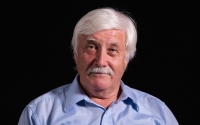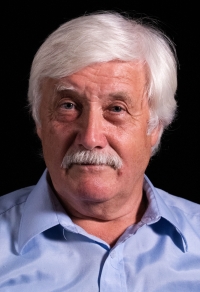František Pospíšil
* 1952
-
“I remember the First of May celebration that we had organized after the Revolution. In Pečky - provided that the communists were there, the Russians used to be present there, and as the huge parades used to be organized there as well - all of the factories had compulsory allegorical cars and other equipment. We prepared balloons for children and lemonade and gave a speech at the city hall on behalf of the People's Party. Somewhere in the corner was standing one citizen, more or less elderly, who had been looking at us, the rest was afraid. The subconscious feeling that the communists could return was still present. In fact, it really wasn't easy in that city of Pečky.”
-
“At the beginning, there was only one manifestation in Pečky, as everyone was afraid. Then Valtr Komarek came to visit us and I went to the ZPA Pečky company with him. We arrived there to explain the situation to the workers. Keeping in mind that Pečky used to be a downright working-class city, members of the Civic Forum who visited ZPA had arranged that we would present the Civic Forum’s proclamations at the ZPA company.
I was there with that of Mr. Komárek. We crawled around the whole factory, where we were not given any chance to give a speech because the mint masters were too afraid. For instance, we had been standing by one of the machines, from where we just got thrown out and were moved to another device, where Komárek just said something. Suddenly, we had happened to be at the company’s gatehouse – our mission went wrong, as we were not allowed to say anything. Provided the city of Pečky was so much pro-Communist, many of the people there were scared.“
-
“I am still aware of what my mother used to teach me: humility, patience, and love. I still stand firm by the opinion that every politician should have these qualities. 'Being a mayor, that's not an occupation, that is a mission. You do your mission there, that's how you have to deal with it.' When you think about the salaries we had started with, and listening to my kids complaining about those twelve years being the worst, as I was never home. I did not know about my family whatsoever, did not have time for them. My wife was mad at me that I was still somewhere else, many the times I came home and she was telling me: 'Where is Terezka?' And only then I realized I had left her at the kindergarten…So I was running back there, while the nice teacher was already taking her to our house.“
-
"When they made you move to Pečky, how did the local people there look at you? ” “They were quite distant. They looked down on mom, even on my dad. In that local JZD (agricultural cooperative), where mom and dad used to work – my mom at the department selling vegetables – both of them did not have it easy there. Classmates used to mock us for going to church. We attended religious classes, and that was no longer seen as trendy back then. We had problems with that. They laughed at us any time the teacher announced the religious classes to start. ” “ Did you attend the Pioneer club as a child? ” “ Not the club as such, but of course, we had to wear the scarves. There was a book of which one of our classmates took care, and she would note down any time we forgot that scarf. There were always troubles with that.”
-
“As we all lived in one room, my mother used to straighten all the mattresses we slept on at nights. We only had two beds, and it was five of us. One night, there was a big rumble. Some stubs have invaded us. I didn't have any conscience of it, but my mom explained it to us later. Those stabbers attacked my dad for allegedly stealing some scrap. They were feeding the pigs and the scrap had been disappearing. They attacked my dad for being something like a class enemy, therefore, it might have been him who was stealing the scrap. They searched throughout the whole apartment, looking for the scrap, but of course, they found nothing. We, children, did not understand at all what was going on. I told my mom that they had to apologize to Dad after all. Daddy, however, then asked at one of the meetings if someone would give him an apology. In the end, it was discovered that it was the leader of the feeding group was actually the one stealing. He was stealing it for himself. When Dad arose at one of the meetings, he was told to sit back down and be glad they wouldn't do anything to him. So they didn't even apologize to him. The comrade who was stealing was given only a warning, as the reason behind why they found it at his place was that he had probably made just a mistake.“
-
When we were forced to leave our farmhouse, they had moved us out into a single room that was without windows. It was as terrible as my mother used to say. There were no windows, no chimney, nothing. They took everything from us, and we were not allowed to own anything. My father just managed to hid his motorbike, on which he used to go to Kutná Hora, taking the windows, one by one, to let them glassed up at the local glassier. Well, it was very hard. The house was rebuilt again; nevertheless, there was no water supply nor electricity. My oldest sister went to school four kilometers every day, and she had to bring some provender on her way back – a loaf of bread and some milk. We had been proclaimed as the rich ones during the communism, as we used to have a farm, but that was not true whatsoever. My mother used to talk about all of the people my parents had helped in the past; however, there was only one lady to whom my father could reach to get some milk. Nevertheless, he had to go at night; otherwise, he could have compromised the safety of these people, that they had ganged up with the Pospíšil family.
-
Full recordings
-
Praha, 06.06.2019
(audio)
duration: 01:42:45
Full recordings are available only for logged users.
The communists evicted us and the family had to move into a single room without water supply and electricity.
Eng. František Pospíšil was born on May 14, 1952, Kutná Hora. He comes from a family of so-called kulaks (rural rich), forcibly evicted from their farmhouse in Mezohleze near Kutná Hora in 1952. Following their refusal to enter into the local JZD (Unified agricultural cooperatives), the communists expropriated the family’s property. Their farmhouse was said to be one of the largest located in the Kutná Hora region. A five-membered family was evicted by the communist’s officals and moved into a secluded house nearby Mezohleze, where all of them lived in one room without water supply and electricity. His father had to work at the local lime production company and grandfather was placed into a small house without electricity. Following the consequences of enormous stress caused by the forced eviction and expropriation of soil, his grandmother passed out and died soon after. Similar fate awaited his parents, as they had become seriously ill due to living under constant pressure and harsh working conditions. Both Jaromír and Slávek Chlapec, brothers of František´s mother, had been prisoned in the communist’s concentration camps during the 1950s. After six years, the Pospíšil family moved to Pečky, where they started to work at the local JZD. A family with an imprinted ‘kulak’ label had had a hard time getting used to a completely new environment. Their kids were bullied at school because of the family’s religious beliefs. František attended a primary school in Pečky and later, in 1967, he started a general high school in Poděbrady. During the year of 1968, his mother had been politically active, collecting signatures on behalf of the public initiative called Dva tisíce slov (the Two Thousand Words), something that was sooner than later inscribed into her kids’ school evaluations. Consequently, František was not accepted to the Faculty of Electrical Engineering in Prague, thus continued only with extension classes in Pardubice. Eventually, he was accepted and graduated from the university in Pilsen, majoring in high-voltage current. Between 1978 and 1989, he worked at Tesla Kolín. Firstly as a constructor, later as a programmer of CNC systems and operations of lathe machines. František started a family in 1979. They all lived in Pečky and moved to Kolín later. In November 1989, František Pospíšil became an initiator of political change in Pečky, was an active member of the Civic Forum and served three periods as a mayor of the city of Pečky.
The farmhouse in Mezohleze was regained by his family members through the state restitution program in 1994, and is currently in possession of František’s son. The story of the Pospíšil family was narrated by Miloslav Růžička in a publication named Vyhnanci - akce “Kulak” (Expellees - Action “Kulak”).

